|
|
|
Sort Order |
|
|
|
Items / Page
|
|
|
|
|
|
|
| Srl | Item |
| 1 |
ID:
121922
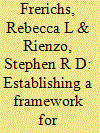

|
|
|
| 2 |
ID:
163383
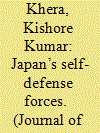

|
|
|
|
|
| Summary/Abstract |
Japan banks heavily on her security alliance with the United States (US) to ensure availability of requisite military capability in the region. China’s economic and military capabilities have grown in the last two decades, closing the gap with the US. With diminishing differential, especially with respect to China, the US’ deterrence power has gradually declined. Under these conditions, Japan has to develop Self-Defense Forces (SDF) capabilities to ensure that it, in combination with its alliance partner, the US, is able to meet national security challenges. In a major shift in security policy, on 9 January 2007 Japan’s Parliament approved the upgradation of Defense Agency/SDF to a full-fledged ministry. However, the changes in the SDF, especially in its doctrine and roles, have been gradual. Till SDF graduates to have an offensive capability that can deter capably, the US will continue to be a key player in Japan’s security milieu.
|
|
|
|
|
|
|
|
|
|
|
|
|
|
|
|
| 3 |
ID:
155248
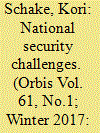

|
|
|
|
|
| Summary/Abstract |
The most important national security challenge for the next president will be rebuilding a domestic consensus on America’s role in the world. Unless the president can answer fundamental questions voters are asking, she or he will be hobbled in foreign policy. Only having done that can our next president proceed to adopt policies and develop strategies that manage a rising China and a declining Russia, organize countries with common interests to stanch the wildfires burning in the Middle East, and reclaim for our country the international stature that fosters our security and prosperity.
|
|
|
|
|
|
|
|
|
|
|
|
|
|
|
|
| 4 |
ID:
185770
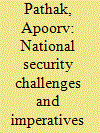

|
|
|
|
|
| Summary/Abstract |
With the Covid-19 pandemic, as the resources are diverted towards medical and social emergencies, an uncharted economic territory necessitates an overall assessment of strategic outlook and subsequent realignment of priorities — in line with available resources. This assessment becomes even more critical at a time when global order is at the cusp of major transformation and India is facing new challenges to its National Security. In spite of its setbacks, the Covid crisis offers the Indian establishment an opportunity to take long pending difficult decisions towards transforming its policy approach and undertaking structural reforms. Through the ‘Atma-Nirbharta’ (Self Sufficiency) policy, India has initiated its movement towards self-dependence in defence manufacturing. However, to meet the future security challenges, a holistic transformation through self-analysis, with ingenious solutions, is the need of the hour.
|
|
|
|
|
|
|
|
|
|
|
|
|
|
|
|
| 5 |
ID:
116615
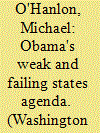

|
|
|
|
|
| Publication |
2012.
|
| Summary/Abstract |
Barack Obama has been a disciplined, pragmatic, and effective president on the urgent national security challenges of the day. His record is generally solid on matters such as managing the nation's major wars, pressuring rogue states, rebalancing the U.S. national security focus toward East Asia, and carrying out the reset policy with Russia. On balance, I would personally rate his foreign policy record through most of his first term as much better than average, with perhaps only George H.W. Bush having done clearly better at this stage among all presidents of the last half century.
|
|
|
|
|
|
|
|
|
|
|
|
|
|
|
|
| 6 |
ID:
118312
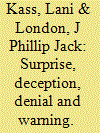

|
|
|
|
|
| Publication |
2013.
|
| Summary/Abstract |
This article frames the highly complex national security challenges of surprise, denial and deception. These ultimate asymmetric threats exploit vulnerabilities, capitalizing on hubris, complacency and self-delusion. Such actions prevent the full and accurate assessment of opponents' capabilities and intentions, and hinder appropriate actions. The long and frequent history of surprise, denial and deception suggest that these are essentially psychological phenomena. They are effective because they challenge and exploit perceptions that fill the gap between what is known and unknown. The authors present decision superiority as the fusion of information dominance and decisive action. Technology and intelligence can enhance decision superiority by ameliorating, but not eliminating, the limits of human perception. Translating knowledge into capabilities and actions requires agile, adaptive processes and open institutional collaboration within the interagency, with global allies and the private sector.
|
|
|
|
|
|
|
|
|
|
|
|
|
|
|
|
|
|
|
|
|